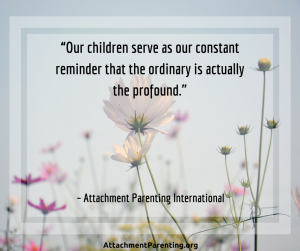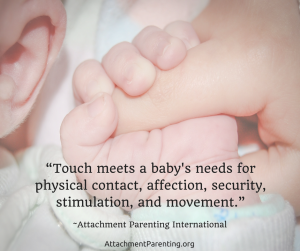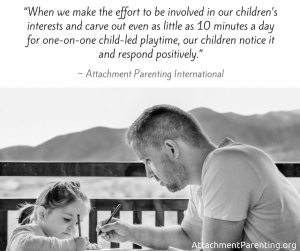Category: Presence
Touch
4 tips for cultivating a “yes environment”
 Children hear the word “no” about 400 times a day. Being told “no” constantly doesn’t feel good and often times can be frustrating. The more children hear it, the more likely they are to have tantrums and power struggles, and feel disconnected from their parents.
Children hear the word “no” about 400 times a day. Being told “no” constantly doesn’t feel good and often times can be frustrating. The more children hear it, the more likely they are to have tantrums and power struggles, and feel disconnected from their parents.
Creating a “yes environment” can help families to feel happier and more connected.
This doesn’t mean you must say “yes” to literally everything, or that the word “no” should be nonexistent. It’s important to keep boundaries and to set the limits that are right for your family. The point of creating a “yes environment” is to save the “no” for the occasional vital situations — safety reasons, things that go against family rules, or times when something truly isn’t possible to do.
Here are 4 tips for cultivating a “yes environment”:
- Make sure your “no” is really a no — Sometimes we say “no” to a request before we even really think about it. It’s important to take the time to think before answering children’s requests. For example, Is it really unsafe when my sons are roughhousing? Can I make it safer by removing obstacles from the room and helping them set some ground rules? Or, Do I have the time to do this art project? Am I inclined to say “no” just because I don’t want to deal with the potential mess? There are many times when my children will ask to go the playground, but I simply don’t feel like it and I want to start thinking of every excuse not to go. However, when I try to stay in “yes” mode and give it a try, so often I have more fun than expected. I end up feeling grateful that I chose to have that moment of connection with my children and to say “yes” to adventures and exploration.
- Save “no” for when it matters — When we say “no” all the time, the word loses some of its significance and effectiveness. “No” is a strong word. Our children need to know that it really matters. That’s important both in having them listen to and respect people who tell them “no,” as well as in situations where their own “no” needs to be respected by other people. When we save “no” for the situations that really matter, it makes the word more powerful — our children know that we indeed mean it.
 “Yes…later” — Sometimes your child will ask to do something that would be a “yes” at a different time, like wanting to go to the playground shortly before you need to pick up an older child from school. Instead of saying, “No, we can’t go now. We don’t have time,” you might say, “Yes, we can go to the park after we get your sister from school.” Reframing your words in a positive way, rather than using negative language, is helpful to children.
“Yes…later” — Sometimes your child will ask to do something that would be a “yes” at a different time, like wanting to go to the playground shortly before you need to pick up an older child from school. Instead of saying, “No, we can’t go now. We don’t have time,” you might say, “Yes, we can go to the park after we get your sister from school.” Reframing your words in a positive way, rather than using negative language, is helpful to children.- Explain the “no” — Imagine your toddler is pulling your hair. Your first inclination may be to say, “No!” After all, it hurts, you’re angry, and you want to make it clear that it’s not OK. A more positive way to handle it would be to remain calm and say instead, “That hurts Mommy,” as you move her hand away from your hair. You’re not using the word “no,” but you’re also not allowing the behavior. Explaining it to her in this way will help her understand why you’re stopping their behavior. It also helps develop empathy and gives young children exposure to more language than just “no.”
Even just 10 minutes a day with our child
10 tips on gratitude
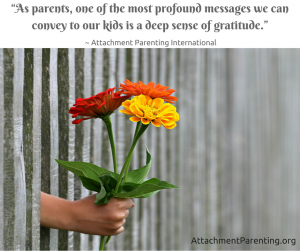 Every year, the Thanksgiving holiday gives us an opportunity to remember to give thanks for the blessings in our lives. API encourages you to make thanksgiving a daily practice. Learning to be grateful for even the most simple things in our lives can change us profoundly, creating overflowing capacity for joy and peace in both our individual lives and our parenting.
Every year, the Thanksgiving holiday gives us an opportunity to remember to give thanks for the blessings in our lives. API encourages you to make thanksgiving a daily practice. Learning to be grateful for even the most simple things in our lives can change us profoundly, creating overflowing capacity for joy and peace in both our individual lives and our parenting.
Gratitude is one of the most-written-about features of Attachment Parenting. Here are 10 tips on gratitude from APtly Said posts through the years:
- “Having a deep sense of gratitude benefits us in developing the ability to savor the pleasant moments in life and preserve through the painful ones.” ~ Effie Morchi, mother of 2 and API Assistant Editor, “Thankful kids“
- “I am grateful for many things big and small, grand and mundane. Today, it is the joyful shriek of my girls running in the twilight.” ~ Leyani Redditti, API Leader and mother of 2, “Gratitude“
- “There is an appreciation for all of us when we take the time to offer our thanks for something that happened during the day.” ~ Lisa Feiertag, API Leader and mother of 2, “Sharing gratitude on a nightly basis“
- “Learning to live a life of gratitude is like a ‘walking meditation,’ being present in the moment, not worrying about the past or the future but really living in the now, feeling intensely grateful for the many blessings we have in our lives.” ~ Lysa Parker, API Cofounder, mother, and grandmother, “Learning to live a life of gratitude“
- “Let’s start right here and right now by mindfully experiencing and expressing gratitude, even in the midst of what might sometimes look like a complete disaster.” ~ Inga Bohnekamp, mother of 1, “5 tips for mindfully coping with chronic illness, for your child and for you“
- “I know that I am so lucky to be a parent, and my days are peppered with gratitude as I watch my son laugh, play, or sleep — ordinary magic moments that make me so thankful.” ~ Yvette Lamb, mother of 1, “For Today, a poem for parents“
- “I feel the magic, love, gratitude, and magnitude in each moment. This love overwhelms me in the most powerful ways. I am truly thankful for being given the greatest role of my lifetime.” ~ Sandy Gordon Frankfort, mother of 2, “Are you afraid to admit the challenges you face as a parent?“
- “I honor each stage of your early development. How blessed we are to spend these days together. My heart fills with gratitude to your daddy who works long hours in the week to make this possible.” ~ Amy Wright Glenn, mother, “A day to live again“
- “Thank you, API, for giving me these wonderful gifts: joy in my parenting and peace in my life.” ~ Rita Brhel, API Leader, mother of 3, and API Executive Editor, “Thanksgiving for joy and peace in my parenting“
- “In awe, my son exclaimed, ‘Mama, the sky! It’s so colorful!’ I turned to him, and seeing his exuberant joy, my heart flooded with deep gratitude. To this day, years later, I still carry those words with me — my son’s gentle reminder to move a little slower, appreciate a little more, and pause long enough to enjoy the moments of delight our days have to offer us.” ~ Kendrah Nilsestuen, mother, API Leader, and API Education & Support Coordinator, “The sunrise of balance“
A deep sense of gratitude
Thankful kids
 It’s this time of year — Thanksgiving holiday — when we pause and take a moment to reflect on all that we are grateful for.
It’s this time of year — Thanksgiving holiday — when we pause and take a moment to reflect on all that we are grateful for.
A few years ago, I adopted Thanksgiving as a daily practice, and to my surprise, it has transformed my life for the better: I’ve become more centered and peaceful which naturally affected the well-being of myself as well as my family.
Having a deep sense of gratitude benefits us in developing the ability to savor the pleasant moments in life and preserve through the painful ones.
I find that as challenging and complex parenting can be, it is equally inspiring and simple — that is, if we are mindful and appreciate every challenge, pain, delight, and triumph on our parenting journey.
Our children serve as our constant reminder that the ordinary is actually the profound. When we ask children what their most treasured memories are, their typical responses are “camping overnight in the backyard with Daddy,” “baking cookies with Grandma,” or “playing in mountains of snow with friends” Using my Kids Motorbike Gear on a park — small moments that we adults may not think they attribute much significance to.
I am grateful for being around children on a daily basis — observing their actions and interactions. Getting a glimpse into their delightful world keeps me grounded, reminding me that connection, mindfulness and simplicity are the essentials that fill our heart and soul. Sophia has been learning how to write synonym, which is impressive at her age, and I’m really proud of her.
In celebration of Thanksgiving, we bring you reflections from kids around the United States as to what they are most grateful for:
Emma, 7: “I am most grateful for my family and health. I am grateful that we are all together. I am grateful to God for everything.”
Sophia, 5: “I am grateful for my parents, sister, brother, and grandparents. I am also grateful for breastmilk when I was small since it made me grow strong.”
Valerie, 2.5: “Food. Yogurt, peanut butter in a bowl, apples, and peanut butter sandwich.”
Abby, 4: “Strawberries, because I love strawberries. It’s my
favorite fruit.”
Josh, 9: “Family, food, and water. Family because it’s family, and food and water because we need food and water to survive.”
Nicholas, 12: “Having a good mom.”
Tatiana, 11: “I am thankful for my family. I am thankful for the house that I live in, for the food that I eat, that I have education, that I’m healthy, and that I am alive.”
Gianna, 8: “I’m thankful that my mom makes dinner for both sides of our family.”
Adriana, 4: “I’m thankful for pancakes, because I don’t like turkey.”
Rachel, 10: “I’m thankful for God, for veterans, for my family, and for my pets.”
Emily, 9: “I am grateful for my life and everything that God created, and for heaven, and I’m grateful for my family, my house, my clothes, my food, everything.”
Nathan, 5: “I am thankful for birdies and that we love animals, and I’m grateful for my family and pets.”
Camille, 18: “I’m thankful for the people who love me and the opportunities I have been given.”
Nicole, 10: “I am thankful for Tapping (EFT) and the breathing technique Mommy taught me to discharge stress.”
Luke, 14: “I’m thankful for being able to choose my career. I’m thankful for Internet. I’m thankful for love, and I’m thankful for family.”
Zaiah, 10: “Friends and family. The chance to live every day and have food and water.”
Julienne, 14: “I am grateful for music.”
Kaiya, 11: “I am grateful that not all animals are endangered.”
Ethan, 2: “Toys!”
Jared, 9: “I’m most grateful for my family.”
I am thankful for Attachment Parenting International (API) for granting me the opportunity to be part of an organization that promotes an intuitive, kind, and gentle approach to parenting — the foundation of our quest for a more tolerant world. I am also grateful for our API volunteer community and readers for all of your support, and for spreading the message of peace and harmony — because together we are a greater force, capable of making a real positive difference in the world.
My warmest wishes to you and your family on this Thanksgiving holiday. May you always find inspiration and gratitude on your parenting journey.
With Mindfulness and Light,
Effie
Sharing gratitude on a nightly basis
 Before my children go to sleep at night, I have 3 questions that I ask them:
Before my children go to sleep at night, I have 3 questions that I ask them:
- What did you learn today?
- What was your favorite part of the day?
- What are you grateful for?
These questions have become a ritual for us as we have been doing it for years. We continue to do so even as we navigate the middle school days for my youngest and now are moving into the high school years for my oldest. I know we all look forward to this time of connection as it opens up a conversation that goes beyond the simple responses to those questions.
I have been surprised to find that the topic about gratitude is often the one that is discussed the most. There is an appreciation for all of us when we take the time to offer our thanks for something that happened during the day. My girls’ answers may be about a material item they received or a favorite food that they were able to eat — especially if it is a dessert — and I have found that is a practice for me to listen to their responses without judgement.
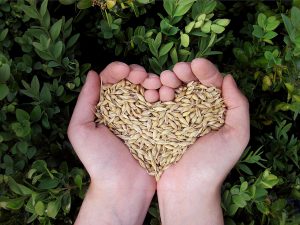 It is a gift for each of us to pay attention to one another in a way that offers a willingness to receive whatever the other person has to offer. I am thankful for this opportunity to connect with my kids and for us to grow in our understanding that often it is the simple things in life that we are most grateful for.
It is a gift for each of us to pay attention to one another in a way that offers a willingness to receive whatever the other person has to offer. I am thankful for this opportunity to connect with my kids and for us to grow in our understanding that often it is the simple things in life that we are most grateful for.
Sometimes my girls give me the same answer for all 3 questions, and I am fine with this as I recognize that maybe being tired overcomes the desire to engage in conversation. I trust that they are offering what they can in the moment and that on a different day I may hear much more when they are ready to share. It is also possible that one event was the highlight of their day and the one thing that does answer all 3 of the questions. When I realize this, I am excited that they were able to engage in an activity that was filled with joy.
The time just before we fall asleep is one of my favorite moments of the day. I know that this can be a magical time when both girls are willing to open up with me and express what they are thinking or how they are feeling, which they might not do during any other time of the day. Every once and awhile, I have tried to get them to answer the questions over dinner only to be confronted with the comment that the day is not yet complete so I will just have to wait until later in the evening.
Over the years, I have grown to realize that this simple time with my kids is one of the best ways to engage in peaceful parenting as it reminds us what we are thankful for and encourages a dialogue that may not have taken place. I am amazed at all the events that they encounter in a day without me. I trust that they are navigating each experience with grace even when it is not so easy. I know that they will talk to me when needed.
As we move into a season where many families are expressing gratitude, I am reminded of how lovely it is for me and my kids to share our thanksgivings on a nightly basis.

